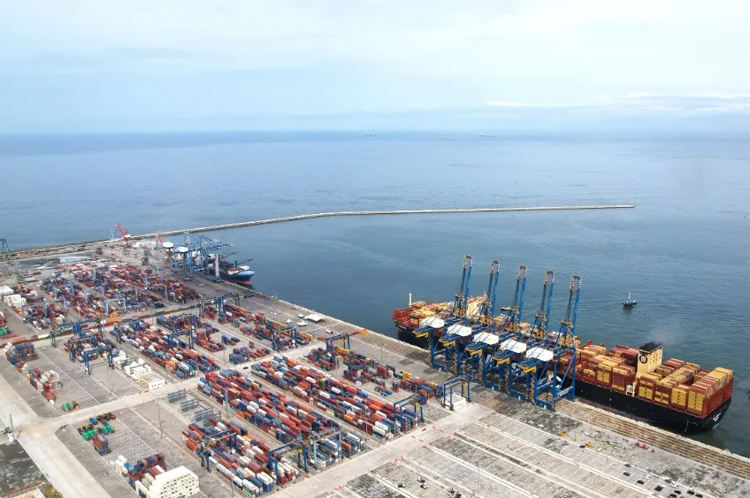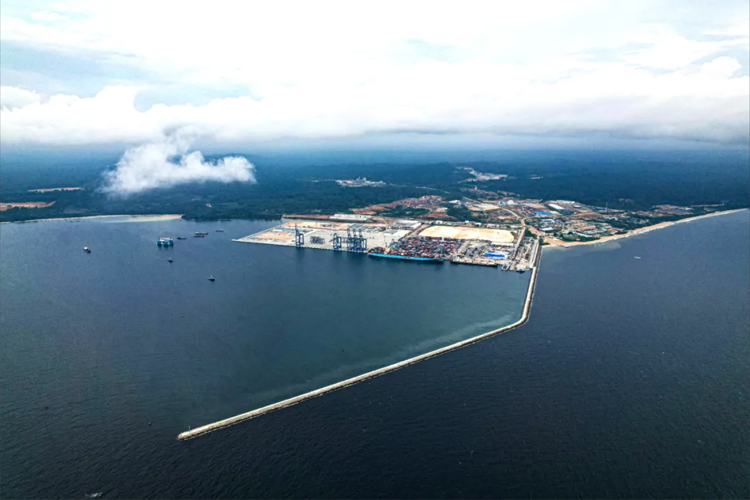Original title:Chinese-built deep seaport becomes beacon of hope for Cameroon
On May 9, a 400-meter-long ultra-large container ship was moored in the Gulf of Guinea between the deep sea and the blue sky. As one of the world's largest container ships with a capacity of 24,346 TEU, the MSC Türkiye elicited awe and admiration.
"Kribi is now one of only five ports in sub-Saharan Africa able to host ships of this size," said Philippe Labonne, chairman of Africa Global Logistics, at the commissioning ceremony of the second phase of the Kribi Deep Seaport.
Today's scene stands in stark contrast to 14 years ago, when villagers of Mboro, in the southern Cameroonian town of Kribi, relied on small dugout canoes for fishing as they struggled to escape the grip of poverty. At the time, Mboro was a remote and largely inaccessible settlement, home to only a handful of residents.
That changed in 2011, when the Chinese arrived and began building a deep-sea port and related infrastructure across 26,000 hectares.
When we visited Mboro in 2019, China Harbor Engineering Company (CHEC) had already completed the first phase of the Kribi Deep Seaport, and the construction of the second phase was in full swing with nearly a thousand workers on site.
Work on the second phase is now done and dusted. The megaport with four berths stands as a beacon of hope not only for hitherto unknown Mboro but for the entire country.
The port has transformed the once-sleepy fishing village into a logistical powerhouse set to reshape Cameroon's economy.
Since the 1970s, the Cameroonian government has been planning to build a deep-water port because the only major port, Douala, is located in an estuary too shallow to accommodate large ships.
Thanks to Chinese funds and technology, the dream has come true.
We are proud that the Kribi Deep Seaport is the largest in Central Africa, designed to facilitate both imports and exports.
"Here, docking 100,000-ton ships is not a problem," said Eric Hermann Defo Fotso, an engineer and one of the hundreds of local workers employed by the CHEC.
Cameroon has a considerable appetite to industrialize, and the new port offers a ray of hope for that ambition. In 2021, we experienced firsthand how the port attracted a lot of external investment through the construction of a cocoa factory, two cement plants, and a wood processing company, among others.
For Patrice Melom, general manager of the Port Authority of Kribi, the port's contribution to national wealth has been significant.
"The future of the port of Kribi looks promising, bringing concrete results and extremely positive prospects," Melom said. "It is now up to us to mobilize all our energies, sustain the efforts undertaken, and make this infrastructure a true driver of sustainable growth, serving national prosperity and sub-regional integration."
As part of the project, the CHEC also constructed the Kribi-Lolabe highway to meet the requirements of the port transportation and logistics and make a contribution to local prosperity.
"This highway connects the Kribi Deep Seaport with major cities nationwide, facilitating personnel travel and goods transportation, thus promoting Cameroon's industrialization," said Emmanuel Nganou Djoumessi, Cameroon's minister of public works.
There has been a spillover of the positive results of the new port into Ndoumale and Bagyeli villages, located some 25 km from the port.
Last year, we visited the two villages. In Bagyeli, pygmies danced gaily, welcoming the installation of solar panels by the CHEC.
"We use it (light) in the kitchen," said Marie Belle Ndabouane, wife of the leader of Bagyeli. "When children go to school, they will turn on the light."
As part of its corporate social responsibility, the CHEC built roads and bridges in Ndoumale. Meanwhile, Chinese construction company CGCOC Cameroon Ltd. built a drinking water treatment plant and related supporting facilities in Ndoumale, which can produce 7,000 cubic meters of water per day.
Local children now attend classes in a six-classroom building that once housed CGCOC Chinese workers constructing the water plant, and was transformed into a school upon completion of the project. It is the only primary school in Ndoumale village and has been functioning for four years.
"Before, the children could not go to school, but now everyone attends school since it is close (to them)," said 27-year-old Louise Njole Edjenguele, head of the school.
"The Kribi Deep Seaport stands as one of the flagship projects of China-Cameroon cooperation and serves as a model for China-Africa collaboration under the Belt and Road Initiative," said Chen Ze, general manager of CHEC Central Africa Division.
"Kribi port, as a harbor of international friendship, has brought together people and equipment from over a dozen countries, including Cameroon, China, France, Switzerland, and Tunisia. Through cooperation, we have built lasting friendships," added Chen.
As many Cameroonians believe, we are confident that one day, Kribi will be known to the world.



